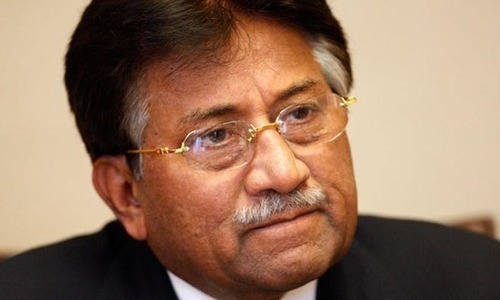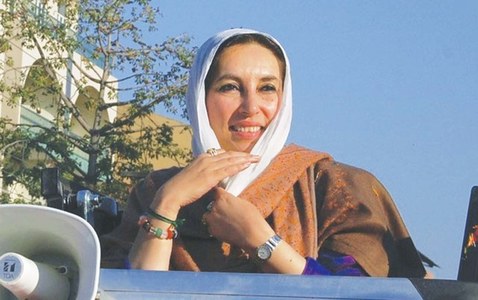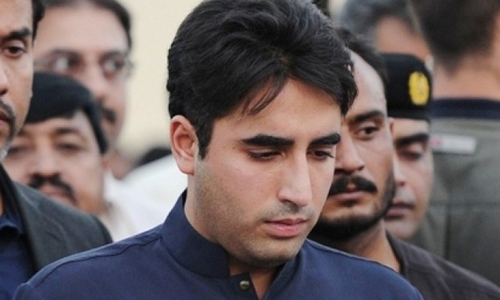ISLAMABAD: The prosecution in the Benazir Bhutto assassination case and an official of the Inter-Services Intelligence (ISI) weakened the case against the five terrorism suspects which led to their acquittal.
An Anti-Terrorism Court (ATC) of Rawalpindi on Aug 31 acquitted five terrorism suspects in the case but convicted two senior police officers — Saud Aziz, who was police chief of Rawalpindi when the former prime minister was assassinated, and Khurram Shahzad, a former senior police superintendent at Rawal Town — for criminal negligence and sentenced them to 17 years imprisonment and Rs1 million fine each.
The judge observed in the verdict that the “prosecution itself was confused”.
The investigation against the five terrorism suspects — Rafaqat Hussain, Husnain Gul, Sher Zaman, Rasheed Ahmed and Etizaz Shah — had been based on a ‘conspiracy’ to kill Ms Bhutto on Dec 27, 2007.
In order to establish that the assassination had been planned by terrorists, the investigators had relied on a telephonic conversation between Baitullah Mehsud of the banned Tehreek-i-Taliban Pakistan (TTP) with a cleric in which the former had congratulated the latter for successfully carrying out the attack on Ms Bhutto.
This was the same audio conversation which the then National Crisis Management Cell (NCMC) director general had released to the media at a press conference a few hours after Ms Bhutto’s assassination.
The investigation of the first Joint Investigation Team (JIT) of the Punjab police had centred on this conversation, while the second JIT, which had probed the murder case under the supervision of then federal minister for interior Rehman Malik, had also treated the conversation as prime evidence.
Piece of key evidence
However, this piece of key evidence lost its value after Mohammad Ismail, an operator of the ISI who had intercepted the conversation, did not appear to testify in court.
The prosecution had relied on this conversation to establish the murder being part of a conspiracy, the 46-page verdict by ATC Judge Asghar Ali Khan noted. The prosecution had also claimed that the confessional statements of the terrorism suspects, forensic analysis of their cell phones along with oral evidence was sufficient to connect them to the murder.
The court verdict had pointed out that the then NCMC director general, testifying before the ATC, had also disclosed where he obtained the audio cassette of the said conversation from. The verdict states: “Brigadier (retd) Javed Iqbal Cheema, who stated that on December 28, 2007 he was director general NCMC Ministry of Interior Govt of Pakistan Islamabad, was called to attend a meeting at the ISI headquarters, Islamabad.”
According to Brigadier Cheema’s statement: “The meeting was attended by the ISI DG, the IB DG and the MI DG … chaired by the President that all facts known to the intelligence agencies so far should be shared with the public through a press briefing.”
It further said, “During the meeting, we (Cheema and then secretary interior Kamal Shah) were given a briefing by Major General Nusrat Naeem (of the ISI) in which the following material was handed over to me. Video footage of the incident and an audio cassette of the intercepted conversation by the ISI between Baitullah Mehsud and one Molvi.”
Intercepted conversation
Discussing these revelations, the court order noted that the witness “disclosed an important fact about a conversation between Baitullah Mehsud and one Molvi which was intercepted by the ISI…The said conversation was translated into Urdu language by Tahir Ayoub, the then SP investigation… Before coming to the contents of the said conversation between Baitullah Mehsud and one Molvi, it is important to mention here that Brig Javed Iqbal Cheema had nowhere in his statement mentioned the source as well as the manner of intercepting the alleged conversation…He had only mentioned that he attended a meeting at the ISI headquarters where he was handed over the video footage of the incident, an audio cassette of the intercepted conversation and an X-ray report of Mohtrama Benazir Bhutto.”
However, the judge noted that Ismail, an operator of the ISI, was mentioned in the police report u/s 173 (Report of police-officer) of the criminal procedure code as the person who had intercepted the said conversation and downloaded it on an audio cassette.
However, the judge noted that: “Surprisingly, the said witness was given up by the prosecution and was not produced in the witness box.”
Subsequently, the judgement states: “Records/data allegedly intercepted by ISI officials was not proved as ISI official Mohammad Ismail who allegedly intercepted the said call was not produced in the court.”
According to the court order, “the prosecution itself was confused.”
The ATC order said: “to establish the conspiracy, prosecution has to prove beyond all reasonable doubt the agreement between the accused persons to kill the deceased.”
It may be mentioned that on Aug 3, 2017, during the concluding arguments, when the defence counsel challenged the admissibility of the audio conversation, Chief Prosecutor Mohammad Azhar Chaudhry of the Federal Investigation Agency (FIA) offered to discard the said evidence.
He not only distanced the prosecution from the said conversation but claimed that it was evidence fabricated by then military dictator retired General Pervez Musharraf to save his own skin.
The ATC judge pointed out that the accused had disowned their confessional statements, while the material which the prosecution had produced before the court was not sufficient to prove the case against the five suspects.
Published in Dawn, September 5th, 2017















































